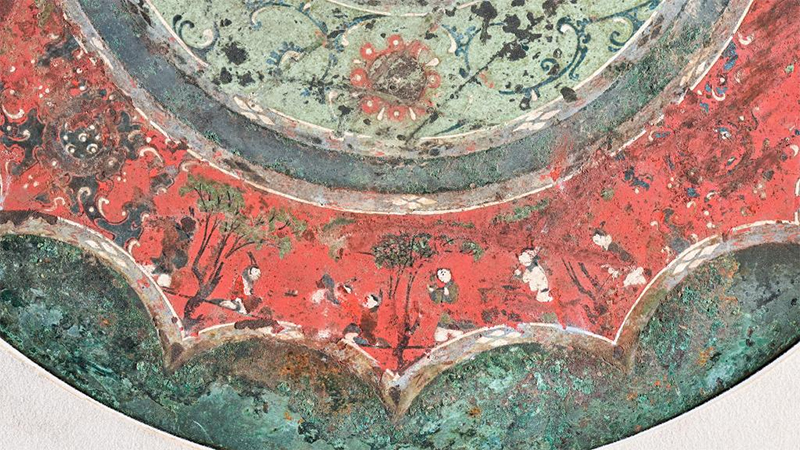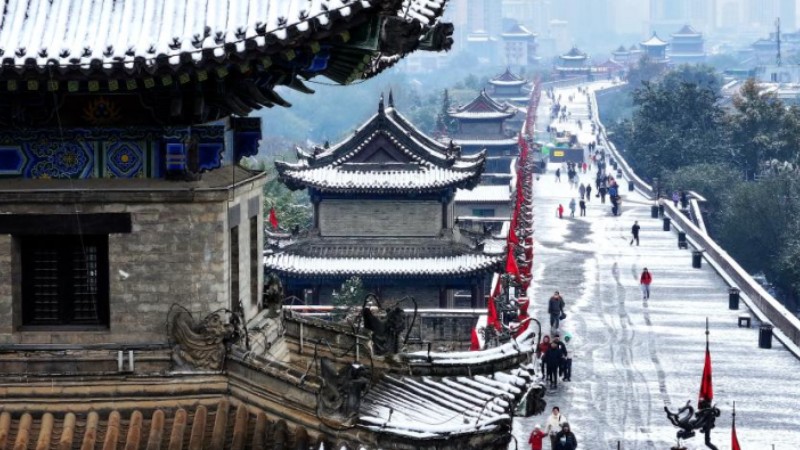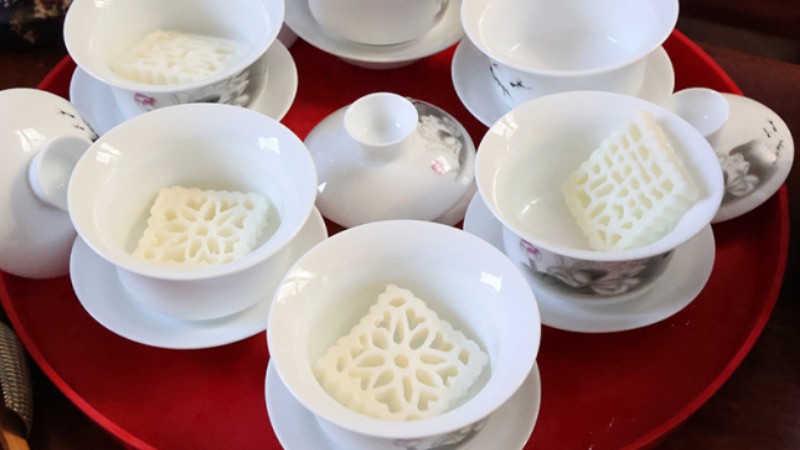Modern take on Chinese classic play resonates with American audience
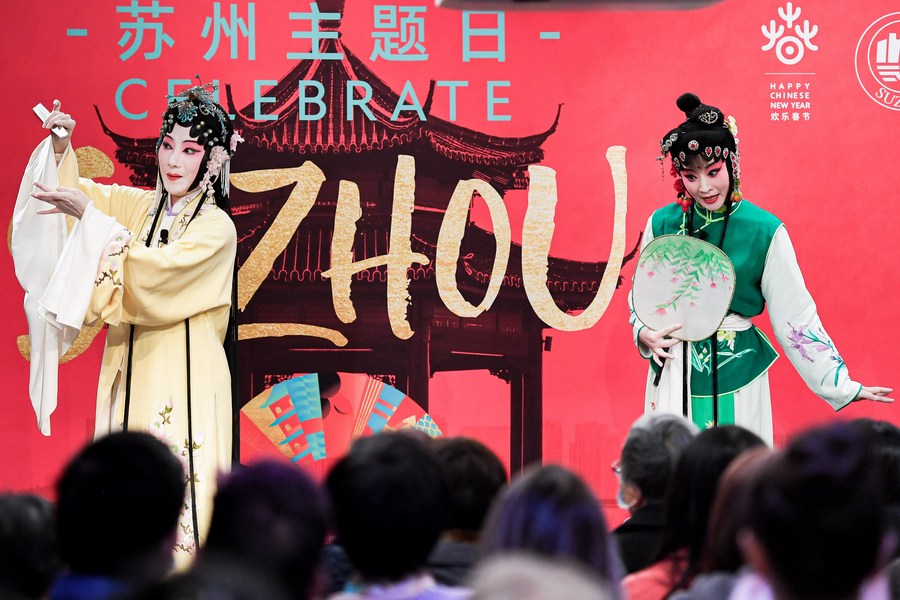
Kunqu Opera performers perform at China Institute in Manhattan, New York, the United States, Jan. 8, 2023. (Photo by Ziyu Julian Zhu/Xinhua)
"It is very Shakespearean, so it was important for me to emphasize the universality of the story instead of just its so-called, 'Chineseness,'" the play's director and 3rd year CalArts Theater major, Duoyi Wang, told Xinhua.
LOS ANGELES, Nov. 13 (Xinhua) -- Young artists bring to life a classic 17th Century Chinese theatre piece, Dream Under the Southern Bough, with a modern take and a diverse cast on Saturday in the first of a week of sold-out performances at California Institute of the Arts (CalArts).
The play, Nan Ke Ji in Chinese, was written at the turn of the 17th Century by Tang Xianzu, one of China's leading classical dramatists, also the author of Peony Pavilion, Handan Dream, The Purple Hairpin, and The Purple Flute.
"It is very Shakespearean, so it was important for me to emphasize the universality of the story instead of just its so-called, 'Chineseness,'" the play's director and 3rd year CalArts Theater major, Duoyi Wang, told Xinhua.
The original play follows a shallow young man lured into the Kingdom of the Ants where he initially finds love and success, only to reap loss and betrayal, before achieving the wisdom to achieve transcendence.
It was written as a brilliant and satirical critique of the often corrupt and hypocritical socio-political structures of the late Ming Dynasty. It still speaks today to humanity's foibles in general as it explores the dangers of the obsessive pursuit of personal desires, the illusory nature of life, and the blurred line between dream and reality.
Condensed from six hours to a more digestible one-and-a-half version and performed in English, Wang brought a fresh interpretation to the 400-year-old masterpiece, in a respectful, yet slightly irreverent way by putting a more humorous, viscerally dynamic and feminist spin on it.
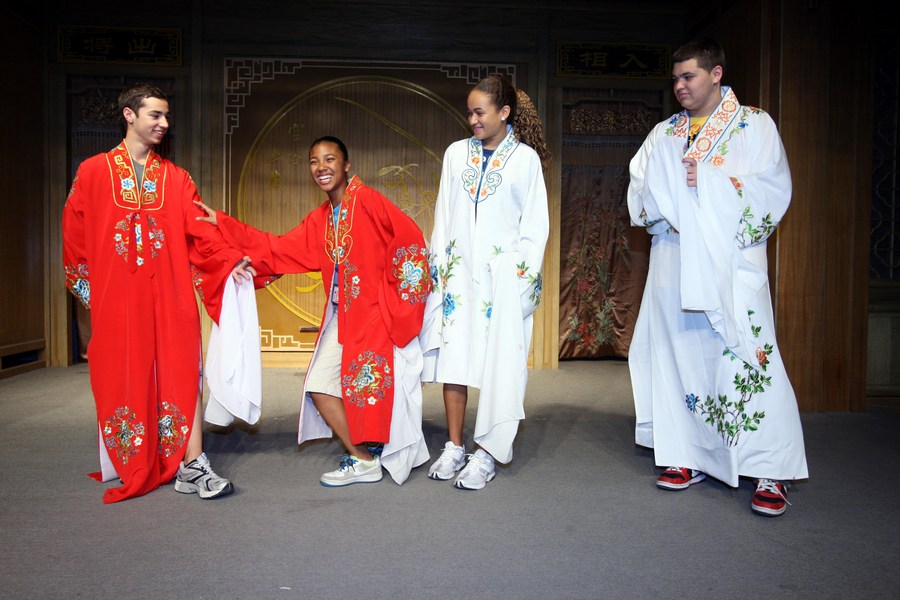
Some students from the U.S. pose on the stage of the Suzhou Kunqu Opera Museum in Suzhou City of east China's Jiangsu Province, June 18, 2009. (Xinhua/Zhang Jian)
Seeking to acknowledge the universal elements of the play's plot and themes, Wang deliberately cast a diverse and international team.
"I believe that Chinese culture is not meant to be just appreciated and understood by Chinese people," Wang, who also goes by Zoe, told Xinhua in an exclusive interview. "On the contrary, it should be cherished by everyone and deserves to be appreciated and understood by people from all over the world."
And the word is spreading. The sold-out performances are attracting audiences as diverse as the cast.
"It's a remarkable work," said Steve Colman, a viewer from Los Angeles. "Who knew a 400-year-old Chinese play would be something that I could actually relate to?"
"Culture is the unspoken elusive poetry woven through the very fabric of societies, cutting across the divides of language, history and belief systems," Wang said in her director's statement. "It is this intrinsic humanity within every culture that forges our interconnectedness."
With her more modern and minimalist approach, infused with multimedia and music, Wang achieved a performance that, as Tang once described his own work, "The wings to fly; to dive below the waves and to rise above the sky; to step back to the past and to leap into the future."
Her cast told Xinhua they were also much inspired.
Jack Goldwaithe from Sugar Land, Texas, who plays, Chunyu Fen, the male lead, told Xinhua it was important to connect with his character regardless of where he came from and what he was supposed to look like.
"I think by making the casting and play more global, Zoe made the entry point a lot easier for most audiences, especially American audiences who are used to seeing diverse types of people in a multitude of roles," he said.
"I am proud to express the other side of our culture, beyond stereotypes," Lucy Ma, a 2nd year CalArts student and actor who played Lady Truffle in the play and was recently signed to a major entertainment company in China.
"There is a lot of Buddhist wisdom in this play," she added. "It's really important to encourage the Asian community to share more stories because our culture needs to be seen and I feel it seldom is here."
"I'm Hindu, not Buddhist," said Ashwath Ram, an Indian student at CalArts, who played Master Qixuan, "But India and China have this age-long relationship with Buddhism that still speaks to people today. Classics are always evergreen and can be performed at any time."
It also resonated with Shireen Hydari, an American actress playing Duchess Qiongying, who self-identifies with both Iranian and African-American heritage. "I have not been as involved in Chinese culture until this play, but, like a lot of fantastical Iranian fairy tales, this one has so much heart and wisdom, as they do."
Matthew Goodrich, who played the king, told Xinhua, "I love Shakespeare, but the world has all these other alternate stories and cultures out there that here in America we are not as aware of."
Justin Henricksen, who plays the prime minister, said he looked at the play as a gift that Wang was giving from her culture. "We got to embrace it and understand things from a different perspective," he told Xinhua. "I learned that we're all more similar than we think -- all kind of going through the same human journey."?
Photos
Related Stories
Copyright © 2023 People's Daily Online. All Rights Reserved.






